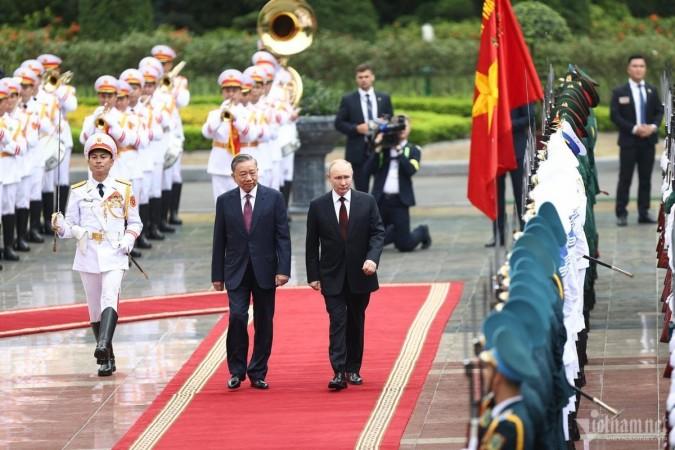
Russian President Vladimir Putin visited Vietnam to expand strategic partnerships amid global isolation. The visit aimed to strengthen economic relations and included an invitation to President Lam for WWII commemorations in Moscow.
Putin's visit mirrors historical events where leaders sought alliances amidst international tensions, similar to his recent visit to North Korea Amidst the ongoing Ukraine conflict and increasing isolation, Russia seeks to reinforce ties with remaining allies, shaping future international relations.
Russian President Vladimir Putin recently embarked on a state visit to Vietnam, a move that underscores the importance of expanding Russia's strategic partnership with the Southeast Asian nation. This visit, as reported by state media, included discussions with Vietnamese President To Lam, marking the first day of Putin's state visit to Vietnam.
Putin's arrival in Hanoi, the capital of Vietnam, came after his visit to North Korea. His itinerary in Vietnam included a state banquet following meetings with Nguyen Phu Trong, the general secretary of Vietnam's ruling Communist Party, and Prime Minister Pham Minh Chinh.

The Russian leader's visit to Vietnam is seen as a strategic move to strengthen Russia's international alliances, particularly in the face of increasing isolation on the global stage. Observers suggest that Putin's brief tour of Vietnam and North Korea holds both practical and symbolic significance.
Carl Thayer, a Vietnam expert and emeritus professor of politics at the University of New South Wales in Australia, commented on the visit, Putin's trip to Vietnam will reinvigorate their comprehensive strategic partnership and shore up economic relations through trade and investment commitments by adopting a rouble-dong currency exchange mechanism for goods and services payments.
The visit also saw Putin extend an invitation to President Lam to participate in the 80th-anniversary commemorations of the victory over Nazi Germany in World War II, scheduled to take place in Moscow next year. The ongoing conflict between Russia and Ukraine could also be a potential topic of discussion during Putin's visit. However, the Ukrainian ambassador in Hanoi, Oleksandr Haman, expressed his belief that Vietnam would maintain its neutral stance in the conflict.
This visit is reminiscent of historical events where leaders sought to strengthen alliances amidst international tensions. For instance, during the Cold War, leaders from various nations often embarked on diplomatic tours to consolidate alliances and seek support against opposing blocs.
Putin's North Korea visit
Before his arrival in Vietnam, Putin had visited Pyongyang, where he and North Korean leader Kim Jong Un discussed deepening the relationship between their countries. This was necessitated by their growing diplomatic isolation. North Korean state media reported that the two leaders shared their pent-up inmost thoughts during their meeting.
In the backdrop of these diplomatic maneuvers, the conflict in Ukraine continues to escalate. Dutch air force commander Gen Arnoud Stallmann has stated that F-16 fighter jets are expected to be on the battlefield in Ukraine by this summer. Meanwhile, Romania has announced its decision to donate two operational Patriot systems to Ukraine.
Undoubtedly, Putin's state visit to Vietnam is a strategic move aimed at strengthening Russia's international alliances and economic partnerships. Amidst the ongoing conflict in Ukraine and increasing international isolation, Russia is seeking to reinforce its ties with its remaining allies.
The outcome of this visit could have significant implications for the geopolitical landscape, particularly in the context of the Russia-Ukraine conflict. As the world watches, the unfolding events will eventually shape the course of international relations in the near future.

















